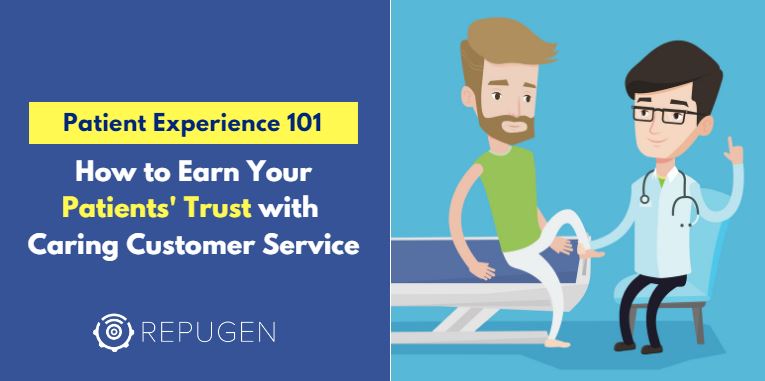
Medical researchers have varied opinions when it comes to conceptualizing and defining patients’ trust.
While a few theorists associate it with a patient’s set of expectations from their physician, there are others who believe that it depends on the confidence that patients have in their physician. However, the collective belief is that the trust of patients directly depends upon their experience with their physician.
Going by this, the most commonly described dimensions of physician behavior on which patients base their trust are competence, compassion, confidentiality, reliability and dependability, and communication.
So how can healthcare providers actually improve their performance on these fronts to win their patients' trust?
An obvious answer to this question would be by providing effective treatment, but that's not all there is to it. There’s no doubt that every patient wants to get well as soon as possible; but it’s also true that most patients rarely get into the specifics of their treatment or the processes they went through, while describing their experience in a survey or within a review.
Different studies on patients' ways of describing the quality of their care suggest that the customer service aspect is the main reason for patients’ unhappiness and distrust.
These aspects could be staff communication, ambient noises, insufficient information, cleanliness, etc. They are also the deciding factors when it comes to measuring a practice's HCAHPS scores. We all know that improving HCAHPS score is important as it benefits by increasing your practice's reimbursement.
So here's how you can make your customer service more effective in order to earn your patients' trust:
Effective communication is the most important factor in improving patients’ experience. Not only is an improved patient-provider communication is a must, but clear and fruitful communication between nurses and patients is also important as it improves nursing experience.
This is a big factor of customer service in healthcare. That's why HCAHPS surveys include several questions that address communication between nurses and patients. For example:
Hence, hold small separate sessions with your nurses focused on developing their listening skills, explaining methods, responsiveness, as well as courtesy and respectfulness. Also, train them for a patient-centric and service-oriented approach towards patient care.
Patient education is an important part of customer service. The responsibility to educate patients falls on both the doctors and nurses, as the ability to improve customer service doesn't rely only on the nurses.
Educate your patients to make sure that they are prepared to take care of themselves at home. Use your short interactions with your patients wisely by educating them about their condition, medication, post-discharge plans and follow-up plans. This will make them feel like a partner in healthcare, and will also improve their confidence and trust in you and your services.
Here are the HCAHPS questions that focus on patients’ education:
Educating patients at the time of their discharge or during their transition from a hospital to a long-term care facility is very important. It reduces their anxiety by helping them know what to do post-discharge when they are at home.
Customer service has a big role to play in minimizing patients' pains. Nurses need to keep the prescribed medicines in routine, and they also need to closely monitor how effectively the medicine is working. Furthermore, they also need to report the same to the doctors for remedies.
Here are the newly included pain management-related questions in the survey that show HCAHPS gives major consideration to addressing patient's pain:
Design a high-quality pain management system that ensures appropriate assessment, family input, and includes non-pharmacological therapies. Teach your staff about regular pain evaluation and reassessment so that any deteriorating trend can be caught before it's too late.
Remember, no matter how reputed you are as a doctor, and no matter what great treatment you provide, if you cannot ease your patients’ physical suffering, you cannot expect them to be satisfied with your care.
One HCAHPS survey question specifically focuses on the level of noise in hospitals during the night:
Pay attention to this, as this question often earns the lowest satisfaction scores out of all the questions from the survey. Researches suggest that rest and recuperation in a quiet space is very calming and nurturing for a steady recovery.
So if consistent sounds like ringing phones, beepers, and overhead paging create disruption in sleeping (especially at night), it can disrupt the healing process.
Therefore, ask your employees to switch off their phones, or to keep it on silent mode. You can also use a text-based system instead; as your patients will highly appreciate this.
Eliciting feedback from unhappy or dissatisfied patients helps in understanding what's really bothering them. This is an opportunity to actively involve your patients in the healthcare process, while it also helps you in learning more about the aspects of patients’ experience that need improvement.
healthcare online reputation management tools like RepuGen are highly efficient in helping healthcare providers to monitor and improve their patients’ experience.
Not only do these tools facilitate the patients in sharing their experience, but they also perform a sentiment analysis of the collected data to provide a detailed insight of the patients' emotions during their visits. This kind of detailed understanding helps you in identifying your areas of improvement.
Once identified, you cannot just introduce changes more effectively, but can also rest assured that you are improving you patients’ trust.
The best part of customer service is that it yields valuable results for medical facilities with only small changes required. Where you can effectively gain your patients' trust by improving on the customer service measures like changing staff behavior, lessening wait times, introducing systems that allow patients’ feedback to be heard, and more.
Related Posts
0 Comment
Your email address will not be published. Required fields are marked *